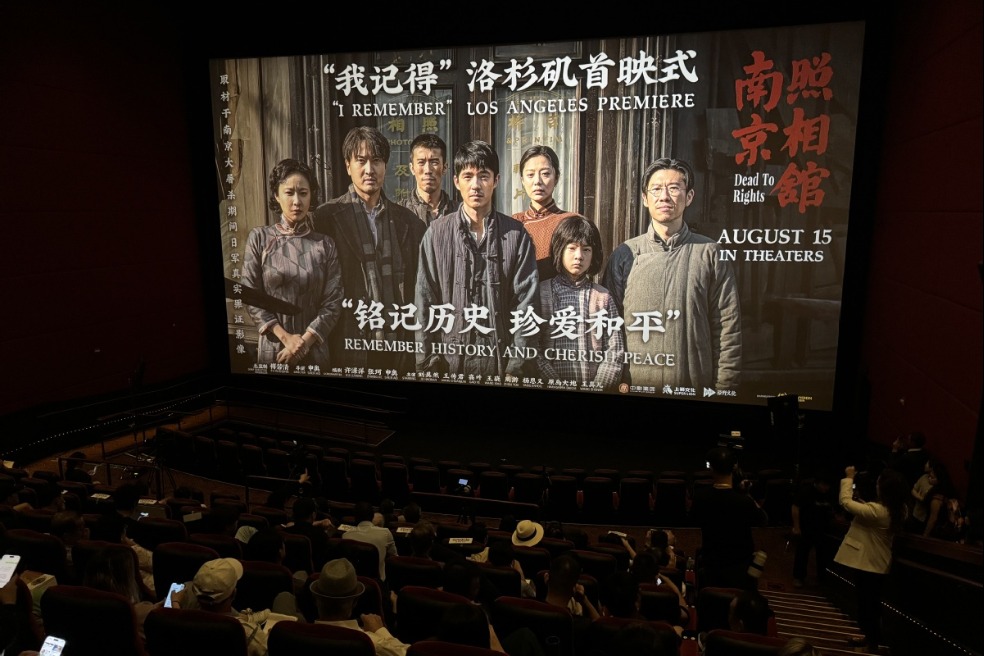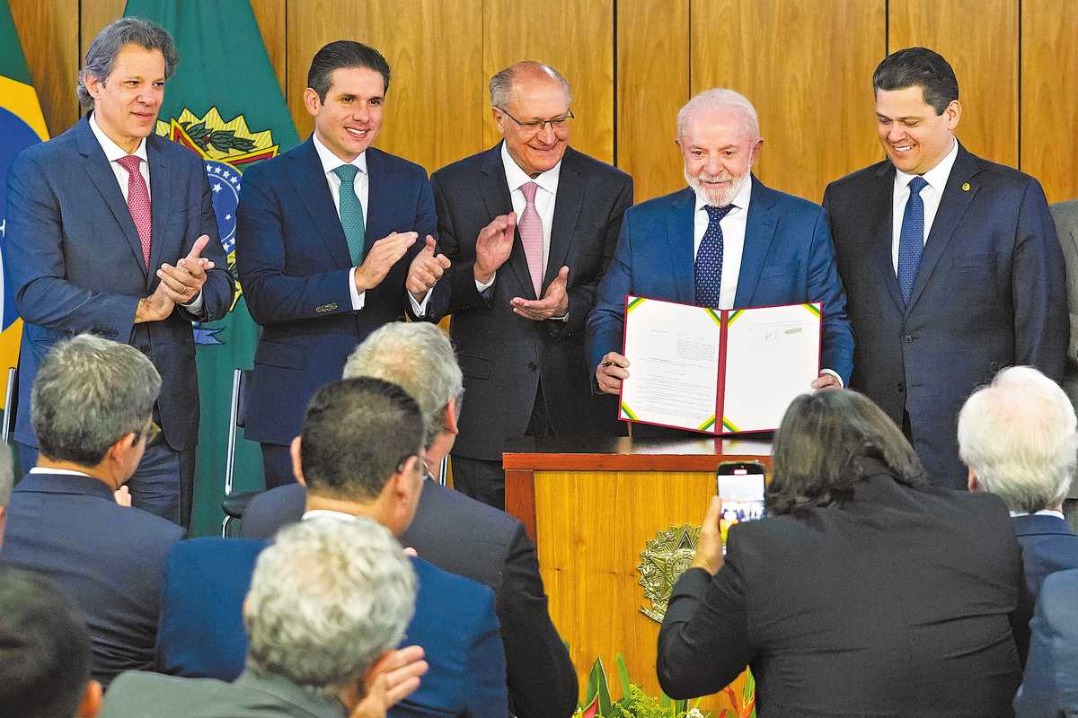China's actions speak volumes on commitment to Global South
Diplomatic efforts, dialogues show unified drive for modernization, governance, peace


Beijing's significant diplomatic actions over the past year illustrate that China, as the largest developing country, will maintain its roots in the Global South and commit itself to providing new opportunities for worldwide development through its own modernization, according to officials and observers.
China is also calling on the Global South to adopt a more open and inclusive approach and foster solidarity and collaboration to realize the modernization of all countries. This should feature peaceful development, mutually beneficial cooperation and common prosperity, and contribute to the building of a community with a shared future for mankind, they added.
Kishore Mahbubani, a distinguished fellow at the National University of Singapore's Asia Research Institute, believes the coming decades belong to the Global South, which is home to 88 percent of the world's population.
"Arguably, many Global South countries across Latin America, Africa and Asia are no longer passive participants on the world stage, instead acting independently of the West in many ways," said Mahbubani, a former senior Singaporean diplomat.
Xie Chuntao, vice-president of the Party School of the Communist Party of China Central Committee, said the Global South, representing emerging and developing countries, is changing the world's economic landscape and becoming a key force in the transformation of the international order.
Xie told a forum in Beijing that the contribution of the Global South to the world's economic growth has reached 80 percent over the past 20 years and its share of global GDP has increased from 24 percent to more than 40 percent in the past 40 years.
Amid the collective rise of the Global South, President Xi Jinping has, on several occasions, encouraged countries in the Global South to work together to be the staunch force for maintaining peace, open development, constructive global governance, and promoting mutual learning among civilizations.
Pillar of development
At the conference marking the 70th anniversary of the Five Principles of Peaceful Coexistence held in Beijing in June, Xi reiterated China's advocacy for an inclusive and universally beneficial economic globalization.
By promoting high-quality Belt and Road cooperation and endeavoring to deliver on the Global Development Initiative, China aims to benefit all with the opportunity of development, to diversify development paths, to help all nations share development fruits, Xi said.
British scholar Martin Jacques said at the Mingde Strategic Dialogue 2024 held in Beijing in September that China has become a magnet with great attraction, and its influence on other countries is increasing.
More countries believe their interests are interrelated with those of China.
Engaging with China will be more conducive to improving these countries' living standards and spurring their economic and social development, Jacques said, adding that China's centripetal force can be reflected in many aspects, such as the Belt and Road Initiative.
Foreign Minister Wang Yi said at a symposium on the international situation and China's foreign relations last week, that substantive progress has been made in promoting high-quality Belt and Road cooperation in light of the urgent needs of participating countries.
He cited the China-Europe Railway Express, which has provided over 100,000 freight train services, with 155 countries already joining the "big family" of Belt and Road cooperation.
China is also moving ahead with the development of the multidimensional Belt and Road connectivity network, one that is led by the building of a green Silk Road, and will also empower a digital Silk Road.
Apart from the BRI, Beijing has introduced numerous visionary concepts and undertaken practical actions to put development high on the international agenda.
During the first session of the 19th G20 Summit in Rio de Janeiro, Brazil, in November, Xi announced eight major actions to support global development, which were considered the embodiment of China's role as a reliable and long-term partner for developing countries and an active contributor to global development.
In September, during the 2024 Summit of the Forum on China-Africa Cooperation, Xi pledged 360 billion yuan ($49.6 billion) in financing to Africa over the next three years as part of 10 partnership actions for jointly advancing modernization.
He announced a decision to give all least-developed countries that have diplomatic relations with China, including 33 countries in Africa, zero-tariff treatment for 100 percent tariff lines, a move that makes China the first major developing country and the first major economy to take such a step.
Since its inception three years ago, the GDI has mobilized nearly $20 billion in development funding and initiated over 1,100 projects.
In June, at the Conference Marking the 70th Anniversary of the Five Principles of Peaceful Coexistence, Xi said that China will work with interested parties to set up a tripartite center of excellence for the implementation of the GDI, so as to facilitate growth in Global South countries.
"China leverages its strength to provide tangible support to Global South countries, ensuring that no one is left behind in pursuing modernization," said Wang Youming, director of the department for developing countries studies at the China Institute of International Studies.
"China shares its advanced capacities, such as new-energy vehicles, lithium batteries, and solar panels, with countries in regions like Africa, Latin America, Central Asia, and Southeast Asia, aligning with their needs for green transition and sustainable development," he added.
Force for peace
Chen Dongxiao, president of the Shanghai Institutes for International Studies, said in modern times Western powers' path to modernization had been characterized by war, colonization, and exploitation, which had caused immense suffering to the people of developing countries, including China. "In contrast, China has firmly committed to the path of peaceful development, a principle enshrined in both the Constitution of the Communist Party of China and the National Constitution," said Chen.
China proposed the Global Security Initiative to help build global consensus to address security challenges and has played a constructive role in maintaining world peace and regional stability, he added.
Kirtan Bhana, founding editor of the Diplomatic Society of South Africa, wrote in an opinion piece: "Xi's advocacy for peace and the launch of the GSI in 2022 present a clear alternative: a system rooted in stability, mutual trust and the inclusivity of shared humanity. This framework challenges the Western practice of imposing artificial divisions and conflicts over resources, promoting a vision of global cooperation instead."
During the 2024 Summit of the FOCAC, China signaled its intent to deepen collaboration with African countries by integrating the principles of the GSI into the partnership, focusing on peacebuilding, conflict prevention, and sustainable security in Africa.
Measures under the partnership include providing 1 billion yuan in military aid, training 6,000 military personnel and 1,000 law enforcement officers, and inviting 500 young officers to China.
On the Ukraine crisis, China, with an objective and impartial stance, has actively promoted dialogue and facilitated negotiations for peace.
It has sent a special representative to conduct three rounds of shuttle diplomacy over the year, jointly issued a six-point consensus on a political solution to the issue with Brazil, and initiated the "Friends of Peace" group together with Global South countries, further strengthening the forces supporting peace.
As the humanitarian crisis in Gaza worsened and conflicts escalated, China proposed a three-step initiative, aiming to achieve a comprehensive, lasting, and sustainable cease-fire in Gaza, support post-conflict governance under the principle of "Palestinians governing Palestine," and calling for the implementation of a two-state solution.
In July, China facilitated reconciliation among Palestinian factions in Beijing, paving the way for a political solution, an essential step toward finding peace in the Middle East. Beijing also announced in May it would provide an additional 500 million yuan in aid to support humanitarian relief work and post-war reconstruction in Gaza, on top of initial emergency humanitarian assistance of 100 million yuan.
Improving governance
Confronting deficits in governance, trust, peace, and development, China has championed genuine multilateralism and the global governance concept of joint consultation, construction and sharing.
At the 16th BRICS Summit in Kazan, Russia, President Xi announced eight pragmatic measures to advance high-quality BRICS cooperation and underscored the group's role as a primary channel for strengthening Global South solidarity and as a leading force for global governance reform.
BRICS represents nearly half of the world's population, accounts for over 30 percent of global GDP, and contributes more than 50 percent of global economic growth.
"Xi's remarks reflected a vision of shared prosperity, mutual respect and inclusive growth, underlining China's leadership role in fostering a just and fair global order," Bhana, from the Diplomatic Society of South Africa, said of Xi's remarks made at the "BRICS Plus" leaders' dialogue.
Xi also announced at the dialogue that China will build a World Smart Customs Community Portal and a BRICS Customs Center of Excellence.
Bhana said these are "not just about boosting China's own economy, but about enabling all BRICS and Global South nations to participate in the digital economy and emerging technologies."
China has offered "a comprehensive blueprint for the reform of global governance institutions", said Malik Ayub Sumbal, a political analyst.
"His address placed significant emphasis on the need for equitable global governance, centered around the shared future and a multipolar world. In stark contrast to the prevailing atmosphere of rivalry that has marked international relations in recent years, Xi called for a development model based on cooperation, mutual benefit and shared prosperity," he said.
China will become an important leader in a world that develops toward multipolarity, former executive director of the United Nations Environment Programme Erik Solheim said, praising Beijing for offering more possibilities for cooperation instead of seeking hegemony.
Dialogue of civilizations
China has put forward the Global Civilization Initiative and is willing to provide more platforms for dialogue among civilizations, which reflects the international and historic responsibility of the world's second-largest economy, said Zheng Yongnian, a professor at the Chinese University of Hong Kong (Shenzhen).
"Dialogue among civilizations is an international public good that can eliminate discrimination and prejudice, enhance understanding and trust, and promote the rational resolution of conflicts and disputes," he said.
Unlike some Western countries imposing their own model of modernization on other countries, Zheng said China advocates dialogue and mutual learning among civilizations to jointly promote the modernization of the world.
To better support Global South cooperation, Xi announced in June that China will establish a Global South research center, provide 1,000 scholarships under the Five Principles of Peaceful Coexistence Scholarship of Excellence and 100,000 training opportunities to Global South countries in the coming five years, and also launch a Global South youth leaders program.
To deepen exchanges on governance experiences, China has expressed readiness to work with Africa to establish a China-Africa network of knowledge for development and 25 China-Africa research centers. A total of 1,000 African political party members will be invited to China for exchanges over the next three years.
Beijing will also invite 200 Arab party leaders to visit China every year, Xi said at the opening ceremony of the 10th Ministerial Conference of the China-Arab States Cooperation Forum in May.
To deepen and solidify people-to-people exchanges, China said during the 2024 Summit of the FOCAC that it is willing to work with Africa to further promote the "Future African Vocational Education" plan, jointly establish engineering and technical colleges, and build 10 Luban Workshops.
About 60,000 training opportunities will be provided to African people, mainly women and young people.
When addressing the 16th BRICS Summit, Xi said China will establish 10 overseas learning centers in BRICS countries to provide training opportunities for 1,000 education administrators, teachers and students.
China proposes establishing an SCO (Shanghai Cooperation Organization) digital education alliance, and is willing to provide at least 1,000 training opportunities on digital technology to fellow countries in the SCO over the next three years, Xi said at the "Shanghai Cooperation Organization Plus Meeting" in Astana, Kazakhstan, in July.
Xi also announced at the meeting that China will provide 1,000 youth exchange opportunities to SCO member countries over the next five years to enhance mutual understanding and friendship.

































